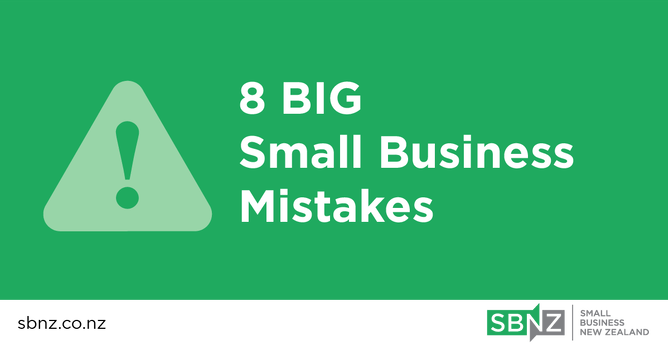Here’s an interesting notion: Do you realise you can make mistakes at various stages of your business’ growth that can slowly harm it for months or even years if you don’t watch for them?
These mistakes are not only made by first-timers running businesses but are often made by those you might think are “successful” because they’ve been around for 10+ years. They're also not limited to service-based companies but are evident across all industries. Below is a list of eight examples to help you avoid making the same mistakes we see time and time again:
1. Underestimating Project/Service Time
This is common for service-based companies and applies to those selling products. Time is money, and you will burn through funds very quickly if you don’t estimate your time to perform tasks efficiently. The best way to estimate time is to do it once yourself or watch your best employee do the task. Then throw in a little buffer time on top. For product companies, time becomes an issue with logistics - so be aware.
2. Not Knowing Your Company Numbers or Incorrectly Setting Prices
It’s a common mistake to use a competitor’s pricing method without knowing why they use those numbers. What if your competition has a terrible pricing structure and barely makes or loses money? What if your costs are more than theirs? You can use competitors as a starting point, but you can’t base your whole strategy on it.
3. Not Charging for All of Your Time & Costs
Most business owners admit they have given away too much of their time. There is nothing wrong with giving a little extra here and there to show you care. But you cannot expect to constantly give out ‘mates rates’ to get business and survive.
The price is the price, and if you are good at what you do, they will respect that and either go with you or look for someone cheaper, but unlikely better. You get what you pay for. On the other hand, stores undermine themselves when they put more people on the floor for customer service but don’t charge for it.
4. Not Getting Paid Fast Enough
The old cash flow issue. As long as you are making enough money to pay the bills, this problem can be solved, prevented or at least managed by doing the below:
- Bill customers promptly. It is very common for a small business not to have the procedures or systems to generate invoices and get them out the door promptly.
- Make the quickest payment terms possible with customers or clients: ensure this condition of working with you is in writing if you provide services or have customers always pay upfront for products or materials.
- Make the slowest payment terms possible with vendors and employees; you should not pay employees more than twice a month.
5. Failure to Have Solid Systems and Procedures in Place
Having no procedures and systems in place will bring chaos and destruction to you and your company. Depending on the type of industry, business owners must come to a happy medium or let disarray and the unknown ensue.
Some basic examples where procedures or systems are needed include billing, collections, payroll, HR (interviewing, hiring, holidays, benefits, job responsibilities, etc.), manufacturing, operations, inventory and logistics, to name a few.
6. Spending Advertising Money and Not Tracking Results
There is no point in a marketing campaign if you do not use performance indicators to measure the success (or lack of). Another no-no is not tracking previously successful campaigns. You would be surprised to know how many businesses think that because a $400.00-per-month ad worked once very well for one busy season, it will automatically work every year after that.
7. Spreading Yourself Too Thin
Did you really go into business for yourself to work 80+ hours a week? The key is figuring out when you are at that “wearing too many hats” point and start outsourcing some help.
Know your strengths and weaknesses, and hire those who are experts at things you are not. If you are the best salesperson in the company, you can’t get caught up in day-to-day operations. If you do, sales will slip and eventually, you won’t have any operations left to worry about.
8. Not Getting Help Soon Enough
Set goals to know when to hire people to take over where you are light on knowledge. Not getting help or waiting too long can kill a company. Most people who start a business do it because they are good at the technical, creative or sales side. If you know the best way to make a widget, then your strength is in production, and that is where your time should be spent. Hire an external company or consultant to take care of the sales and marketing, and then hire internally when you can afford someone full-time.
We hope you found these eight tips helpful. Our members receive access to an ever-growing resource section full of valuable articles like this, free templates and more for a low annual price. Check out our membership benefits page to find out more – we’d love for you to become part of our SBNZ community!


